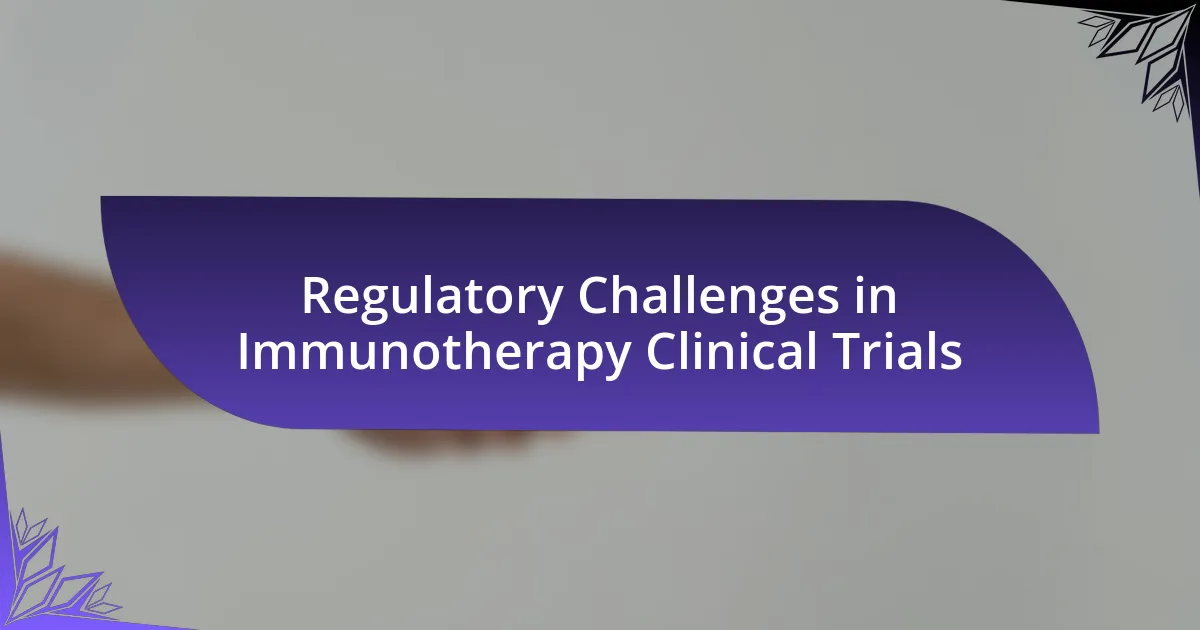The article focuses on the regulatory challenges faced in immunotherapy clinical trials, highlighting the complexities of trial design, variability in regulatory requirements across different jurisdictions, and the necessity for comprehensive safety and efficacy data. It discusses the critical role of regulatory agencies, such as the FDA and EMA, in ensuring patient safety and maintaining the integrity of clinical data through rigorous oversight and approval processes. Additionally, the article examines specific regulations impacting immunotherapy trials, common obstacles encountered during the regulatory process, and strategies for companies to navigate these challenges effectively. Future trends in regulatory approaches, including adaptive trial designs and the integration of real-world evidence, are also explored, emphasizing the evolving landscape of immunotherapy development.

What are the Regulatory Challenges in Immunotherapy Clinical Trials?
Regulatory challenges in immunotherapy clinical trials include the complexity of trial design, variability in regulatory requirements across jurisdictions, and the need for robust safety and efficacy data. The intricate nature of immunotherapies, which often involve novel mechanisms of action and patient-specific treatments, complicates the establishment of standardized protocols. Additionally, regulatory agencies like the FDA and EMA may have differing guidelines, leading to inconsistencies in trial approval processes. For instance, the FDA’s 2018 guidance on cell and gene therapies emphasizes the necessity for comprehensive preclinical data, which can be resource-intensive to obtain. Furthermore, the evolving landscape of biomarkers and companion diagnostics adds another layer of regulatory scrutiny, as these tools are critical for patient selection and monitoring treatment responses.
Why is regulatory oversight important in immunotherapy trials?
Regulatory oversight is crucial in immunotherapy trials to ensure patient safety and the integrity of clinical data. This oversight helps to monitor the potential risks associated with novel therapies, which can have unpredictable effects on the immune system. For instance, the U.S. Food and Drug Administration (FDA) requires rigorous preclinical and clinical testing to evaluate the efficacy and safety of immunotherapies before they can be approved for public use. This process includes reviewing trial protocols, informed consent documents, and ongoing monitoring of adverse events. Such regulatory frameworks have been shown to enhance the reliability of trial outcomes, as evidenced by the FDA’s approval of over 20 immunotherapy products since 2011, which were subjected to stringent regulatory scrutiny.
What role do regulatory agencies play in the approval process?
Regulatory agencies play a critical role in the approval process by ensuring that new therapies, including immunotherapies, meet safety and efficacy standards before they reach the market. These agencies, such as the U.S. Food and Drug Administration (FDA) and the European Medicines Agency (EMA), evaluate clinical trial data, assess manufacturing practices, and review labeling to protect public health. For instance, the FDA requires a rigorous review of clinical trial results, which includes evaluating the statistical significance of outcomes and potential side effects, ensuring that only therapies that demonstrate a favorable risk-benefit profile are approved for use. This systematic oversight is essential for maintaining high standards in medical treatments and fostering public trust in new therapies.
How do regulations ensure patient safety in clinical trials?
Regulations ensure patient safety in clinical trials by establishing strict guidelines that govern the design, conduct, and oversight of these studies. These regulations, enforced by agencies such as the Food and Drug Administration (FDA) and the European Medicines Agency (EMA), require comprehensive protocols that include informed consent, ethical review, and continuous monitoring of adverse events. For instance, the FDA mandates that Institutional Review Boards (IRBs) review trial protocols to ensure that risks are minimized and that participants are fully informed about potential hazards. Additionally, regulations necessitate the reporting of any serious adverse events, allowing for real-time assessment of patient safety. This structured oversight is crucial in maintaining high safety standards and protecting participants throughout the trial process.
What specific regulations impact immunotherapy clinical trials?
Specific regulations impacting immunotherapy clinical trials include the FDA’s Investigational New Drug (IND) application requirements, Good Clinical Practice (GCP) guidelines, and the European Medicines Agency (EMA) regulations. The FDA mandates that any new treatment, including immunotherapies, must undergo rigorous safety and efficacy testing before approval, necessitating detailed protocols and informed consent processes. GCP guidelines ensure that trials are conducted ethically and that data integrity is maintained, which is crucial for regulatory compliance. Additionally, the EMA provides a framework for clinical trial authorization in Europe, which includes similar safety and efficacy requirements. These regulations collectively ensure that immunotherapy trials are conducted safely and ethically, protecting participants while facilitating the development of new treatments.
What are the key regulatory frameworks governing these trials?
The key regulatory frameworks governing immunotherapy clinical trials include the Food and Drug Administration (FDA) regulations in the United States, the European Medicines Agency (EMA) guidelines in Europe, and the International Council for Harmonisation (ICH) guidelines. The FDA oversees the approval process for new therapies, ensuring safety and efficacy through regulations such as 21 CFR Part 312, which outlines Investigational New Drug (IND) applications. The EMA provides a centralized procedure for drug approval across EU member states, guided by the Clinical Trials Regulation (EU) No 536/2014, which emphasizes patient safety and data integrity. Additionally, the ICH guidelines, particularly E6(R2), establish Good Clinical Practice (GCP) standards that promote ethical and scientific quality in designing, conducting, and reporting trials. These frameworks collectively ensure that immunotherapy trials adhere to rigorous standards for participant protection and scientific validity.
How do international regulations differ from national regulations?
International regulations differ from national regulations primarily in their scope and enforcement mechanisms. International regulations, such as those established by the World Health Organization or the International Conference on Harmonisation, aim to create standardized guidelines that apply across multiple countries, facilitating global cooperation and consistency in areas like clinical trials. In contrast, national regulations are specific to individual countries and reflect local laws, cultural values, and healthcare systems, which can lead to variations in approval processes, ethical standards, and compliance requirements. For instance, the U.S. Food and Drug Administration has distinct protocols for clinical trials that may differ significantly from those mandated by the European Medicines Agency, highlighting the challenges faced in harmonizing regulations for immunotherapy clinical trials across borders.
What are the common obstacles faced during the regulatory process?
Common obstacles faced during the regulatory process include lengthy approval timelines, complex compliance requirements, and inconsistent regulatory standards across jurisdictions. Lengthy approval timelines can delay the introduction of innovative therapies, as seen in the average time of 10 to 15 months for regulatory review in the United States. Complex compliance requirements often necessitate extensive documentation and data submission, which can overwhelm sponsors and slow progress. Additionally, inconsistent regulatory standards across different countries can lead to confusion and hinder global trial coordination, as evidenced by varying guidelines from the FDA and EMA.
How do data requirements affect trial timelines?
Data requirements significantly impact trial timelines by determining the complexity and duration of data collection, analysis, and reporting processes. For instance, stringent regulatory standards necessitate comprehensive data sets to ensure patient safety and treatment efficacy, which can extend the time needed for trial approval and execution. According to a study published in the Journal of Clinical Oncology, trials with extensive data requirements can experience delays of up to 30% in their timelines due to the need for rigorous data validation and compliance checks. This correlation between data requirements and trial timelines underscores the importance of efficient data management strategies in clinical trial planning.
What challenges arise from the complexity of immunotherapy products?
The complexity of immunotherapy products presents significant challenges, primarily related to regulatory approval and consistency in manufacturing. Regulatory bodies, such as the FDA, face difficulties in establishing standardized protocols for evaluating the safety and efficacy of these diverse therapies, which can include personalized treatments like CAR-T cells and monoclonal antibodies. The variability in patient responses and the intricate mechanisms of action complicate the assessment process, leading to prolonged timelines for clinical trials and approval. Additionally, ensuring consistent quality and potency across different batches of biologics is challenging, as evidenced by the FDA’s emphasis on stringent manufacturing practices to mitigate risks associated with product variability.

How do Regulatory Challenges Affect Immunotherapy Development?
Regulatory challenges significantly impact immunotherapy development by creating barriers that can delay clinical trials and market entry. These challenges include stringent approval processes, the need for extensive safety and efficacy data, and varying regulations across different countries. For instance, the U.S. Food and Drug Administration (FDA) requires comprehensive clinical trial data to ensure patient safety, which can prolong the timeline for bringing new immunotherapies to market. Additionally, the complexity of immunotherapy mechanisms necessitates tailored regulatory frameworks, as traditional drug approval pathways may not adequately address the unique aspects of these treatments. This regulatory landscape can lead to increased costs and resource allocation for developers, ultimately affecting the pace of innovation in immunotherapy.
What impact do regulatory delays have on research and development?
Regulatory delays significantly hinder research and development by extending timelines and increasing costs. These delays can lead to prolonged periods before new therapies reach the market, which ultimately affects patient access to potentially life-saving treatments. For instance, a study published in the Journal of Health Economics found that regulatory delays can increase development costs by up to 30%, as companies must allocate additional resources to maintain compliance and navigate extended review processes. Furthermore, these delays can result in lost opportunities for innovation, as researchers may shift focus to less regulated areas or abandon projects altogether due to uncertainty in approval timelines.
How do delays influence funding and investment in immunotherapy?
Delays in immunotherapy development significantly reduce funding and investment opportunities. Investors and funding bodies often perceive prolonged timelines as increased risk, leading to a cautious approach in financial commitments. For instance, a study published in the Journal of Clinical Oncology indicated that clinical trial delays can lead to a 20% decrease in investor interest, as prolonged uncertainty can affect market potential and return on investment. Consequently, these delays can hinder the overall progress of immunotherapy advancements, as financial resources become scarcer in an environment perceived as high-risk.
What are the consequences of prolonged approval processes for patients?
Prolonged approval processes for patients can lead to delayed access to potentially life-saving treatments. This delay can result in disease progression, reduced quality of life, and increased mortality rates, particularly in conditions like cancer where timely intervention is critical. For instance, a study published in the Journal of Clinical Oncology found that delays in drug approval can lead to a 10% increase in mortality for patients with advanced cancer. Additionally, prolonged processes can increase healthcare costs due to extended treatment cycles and the need for alternative therapies, further burdening patients and healthcare systems.
How can companies navigate regulatory challenges effectively?
Companies can navigate regulatory challenges effectively by implementing a proactive compliance strategy that includes thorough understanding of regulations, continuous engagement with regulatory bodies, and robust documentation practices. A comprehensive knowledge of the specific regulatory landscape, such as the FDA guidelines for immunotherapy clinical trials, enables companies to anticipate potential hurdles. Regular communication with regulatory agencies, including pre-submission meetings, fosters transparency and allows for clarification of expectations. Additionally, maintaining meticulous records of trial protocols, patient consent, and adverse events ensures compliance and facilitates smoother regulatory reviews. These practices are supported by the fact that companies with strong regulatory strategies often experience faster approval times and reduced risk of non-compliance penalties.
What strategies can be employed to streamline the approval process?
To streamline the approval process in immunotherapy clinical trials, implementing a centralized review system is essential. This approach reduces redundancy by allowing a single regulatory body to assess multiple aspects of a trial, thereby expediting decision-making. Additionally, utilizing adaptive trial designs can enhance efficiency by allowing modifications based on interim results, which can lead to faster approvals for effective therapies. Evidence from the FDA’s Breakthrough Therapy Designation program shows that such strategies can significantly shorten the time from trial initiation to market approval, as seen in the expedited pathways for therapies like CAR T-cell treatments.
How can collaboration with regulatory bodies improve outcomes?
Collaboration with regulatory bodies can improve outcomes by ensuring that clinical trials for immunotherapy adhere to established safety and efficacy standards. This partnership facilitates streamlined approval processes, enhances transparency, and fosters innovation by allowing researchers to align their study designs with regulatory expectations. For instance, the FDA’s Breakthrough Therapy designation expedites the development of therapies that treat serious conditions, demonstrating how regulatory collaboration can lead to faster patient access to potentially life-saving treatments. Additionally, joint efforts in data sharing and risk assessment can lead to more robust trial designs, ultimately improving the reliability of results and patient safety.

What are the Future Trends in Regulatory Approaches for Immunotherapy?
Future trends in regulatory approaches for immunotherapy include increased emphasis on adaptive trial designs, real-world evidence integration, and streamlined approval processes. Regulatory bodies like the FDA and EMA are focusing on flexibility in trial designs to accommodate the unique characteristics of immunotherapies, which often require iterative adjustments based on emerging data. Additionally, the incorporation of real-world evidence is becoming more prevalent, allowing regulators to assess the effectiveness and safety of immunotherapies in broader patient populations outside of controlled clinical settings. This shift aims to expedite access to innovative treatments while ensuring patient safety and efficacy.
How are regulatory agencies adapting to advancements in immunotherapy?
Regulatory agencies are adapting to advancements in immunotherapy by implementing streamlined approval processes and developing specific guidelines tailored to these innovative treatments. For instance, the U.S. Food and Drug Administration (FDA) has introduced the Breakthrough Therapy designation, which expedites the development and review of drugs that show substantial improvement over existing therapies. Additionally, the FDA and the European Medicines Agency (EMA) have established frameworks for adaptive trial designs, allowing for modifications based on interim results, which is crucial for the dynamic nature of immunotherapy research. These adaptations are supported by the increasing number of approved immunotherapies, such as checkpoint inhibitors, which have demonstrated significant clinical benefits, thereby validating the need for regulatory evolution in response to rapid scientific advancements.
What innovations in regulatory science are being implemented?
Innovations in regulatory science being implemented include adaptive trial designs, real-world evidence integration, and advanced data analytics. Adaptive trial designs allow for modifications to trial protocols based on interim results, enhancing efficiency and ethical considerations. Real-world evidence integration utilizes data from routine clinical practice to inform regulatory decisions, improving the relevance of findings. Advanced data analytics, including machine learning techniques, facilitate the analysis of complex datasets, enabling more informed decision-making. These innovations are supported by regulatory agencies like the FDA and EMA, which have issued guidance documents promoting their use to streamline the approval process for immunotherapies.
How might personalized medicine influence future regulations?
Personalized medicine is likely to influence future regulations by necessitating more flexible and adaptive regulatory frameworks that accommodate individualized treatment approaches. As personalized medicine relies on genetic, biomarker, and phenotypic data to tailor therapies, regulatory bodies such as the FDA may need to implement guidelines that support the rapid approval of therapies based on specific patient populations rather than broad categories. For instance, the FDA has already begun to recognize the importance of biomarkers in drug development, as seen in the approval of targeted therapies like trastuzumab for HER2-positive breast cancer. This shift towards personalized approaches will require ongoing collaboration between regulators, healthcare providers, and pharmaceutical companies to ensure that safety and efficacy standards are met while fostering innovation in treatment options.
What best practices can be adopted to overcome regulatory challenges?
To overcome regulatory challenges in immunotherapy clinical trials, organizations should adopt a proactive approach that includes early engagement with regulatory authorities. This practice allows for clarification of requirements and expectations, which can streamline the approval process. Additionally, implementing robust data management systems ensures compliance with regulatory standards, facilitating accurate reporting and monitoring of trial data. A study published in the Journal of Clinical Oncology highlights that early dialogue with the FDA can significantly reduce the time to market for new therapies, demonstrating the effectiveness of this approach. Furthermore, continuous training for staff on regulatory updates and best practices enhances adherence to evolving regulations, thereby minimizing risks associated with non-compliance.
How can early engagement with regulators benefit trial design?
Early engagement with regulators can significantly enhance trial design by ensuring alignment with regulatory expectations and requirements. This proactive approach allows trial sponsors to identify potential issues early, facilitating smoother approval processes and reducing the risk of costly delays. For instance, engaging with the FDA during the development phase can lead to valuable feedback on study endpoints and design, which has been shown to improve the likelihood of trial success. According to a study published in the Journal of Clinical Oncology, trials that incorporated regulatory input at the design stage had a 30% higher chance of meeting their primary endpoints compared to those that did not. This evidence underscores the importance of early regulatory engagement in optimizing trial design and outcomes.
What role does continuous monitoring play in compliance and safety?
Continuous monitoring plays a critical role in ensuring compliance and safety in immunotherapy clinical trials by providing real-time data on participant health and trial integrity. This ongoing assessment allows for immediate identification of adverse events or protocol deviations, which is essential for maintaining participant safety and adhering to regulatory standards. For instance, the FDA emphasizes the importance of continuous monitoring in clinical trials to mitigate risks and ensure that safety protocols are followed, thereby enhancing the overall reliability of trial outcomes.



